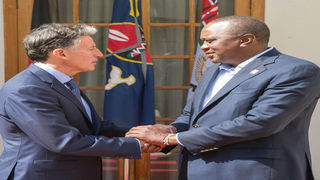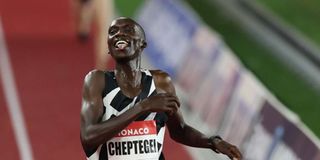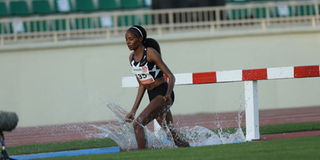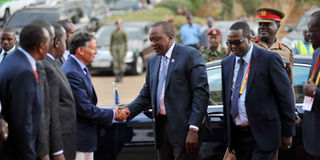
Seb Coe with President Uhuru Kenyatta on the sidelines of the 2017 World Under-18 Championships.
| File | Nation Media GroupAthletics
Premium
Coe predicts bright future for athletics amid virus concerns
What you need to know:
- In a nutshell, Coe is positive it was not a bad year for athletics, under the circumstances.
- Coe also said WA was working towards creating more opportunities for distance races.
- Coe is happy that WA was not only focusing on solving problems, but also “identifying the right problems to solve.”
World Athletics (WA) has endured a turbulent year, but the global athletics governing body’s president Seb Coe is confident the challenges have made his organisation, and the sport, “more resilient.”
Having piloted the Monaco-based WA through the turbulence, Coe believes his international federation is on cruise control and that the prospects of 2021 are mouth-watering.
In an end-of-year interview with leading African sports desks, including Nation Sport, earlier this week, Coe reflected on a difficult, coronavirus-ravaged season that also saw WA wriggle out of negative vibe coming out of the organisation’s former president Lamine Diack’s trial for corruption in Paris.

World Athletics President Seb Coe.
In September, Diack, 87, a former Mayor of Dakar, was found guilty by a Paris court of covering up doping cases by Russia and was handed a four-year jail sentence, two of these years suspended.
The man who had led the global track and field body for 16 years was also fined 500,000 Euros (about Sh6 million) by presiding judge Rose-Marie Hunault who ruled that Diack’s actions “caused serious damage to the fight against doping.”
Having been first elected at the organisation’s sixth president in August, 2015, Coe set out to streamline operations in Monaco, cutting down on unnecessary expenditure and moving to shore up WA’s finances.
Globalising athletics
His focus on globalising athletics saw Nairobi win the rights to host the 2017 World Under-18 Championships and also the 2020 (now 2021) World Under-20 Championships along with a leg of the World Athletics Continental Tour, what was then named the “Kip Keino Classic.”
Commissions and working groups at World Athletics were whittled down from over 30 to just half a dozen and virtual conferences preferred to expensive trips to the principality for working meetings.

Screen grab of World Athletics President Seb Coe addressing African journalists via Zoom on December 14, 2020. He congratulated Athletics Kenya (AK) for its ‘immense contribution’ to track and field.
Diack was notorious for his extravagance that saw his friends, their spouses and girlfriends from Dakar on the global body’s tab for junkets to the affluent Monte Carlo for the annual IAAF Gala, with half of the time spent on shopping sprees rather than track and field business.
Youssour N’dour and “Mama Africa” Miriam Makeba formed part of the high profile ensemble that entertained Diack’s administration at the Gala, usually as the climax of a six-course, black jacket dinner ceremony, mostly at the Monte Carlo Bay Hotel whose current room price per night is up to Sh280,000, bed and breakfast!
Coe drastically cut down on this extravagance.

World Athletics President Seb Coe shares a light moment with volunteers during the World Under-18 Championships in Nairobi in 2017.
The Briton’s administration whittled down the grandeur by organising a pocket-friendly, theatre-style gala with just cocktails and bitings in place of the sumptuous Diack dinners that notoriously sampled Monte Carlo Bay’s culinary delights such as caramelized back of salmon with honey, or “Black Tiger” prawns, virgin sauce with basil, pushed down the throats of excited guests by three scoops of home made ice-creams and sorbets, with the best selection of bottomless wine from the French Riviera’s wineries and vineyards to boot.
“One of the key elements (in 2020) was maintaining our financial security and safety within the organisation because if we keep ourselves safe and protect our own finances and financial management systems, then that was the best way of reducing risk for member federations and our area associations that are reliant upon grant aid from us in order to deliver and develop the sport in their own locations,” Coe highlighted his administration’s financial prudence.
Besides the financial matters, getting athletes back into training after the coronavirus outbreak and juggling around the global athletics calendar were other priorities.
“Going back to March when, clearly, life became very much more complicated because of Covid, for all of us anywhere in the world, with sudden travel restrictions and bans and pressures on athletes, the first objective we set ourselves – which was an understandable one because we are an athlete-centred organisation – was to do everything we possibly could to get the athletes back in training and then into competition,” Coe looked back.

Uganda's Joshua Cheptegei celebrates after winning and breaking the world record in the men's 5000metre event during the Diamond League Athletics Meeting at The Louis II Stadium in Monaco on August 14, 2020.
“That was absolutely vital because as our sport is at the highest level of professional sport, the athletes were suddenly losing their prize money, some of them even having challenges around their sponsorships, yet competition is what they wake up every morning to train for.
“Secondly, clearly because the Olympic Games had been postponed, we needed to expedite our current review of the Olympic qualification standards, systems and release any changes we were making as quickly as we could possibly do to the athletes so that they knew where stood in this odd year.
“To remove an Olympic Games out of one year has a knock-on effect for, in our case, for five years so it was really important that we were organising our calendar and doing it in a way that’s respectful to other events, particularly for some of you in Africa that consider the Commonwealth Games to be a very high priority,” the former middle distance Olympic champion and world record holder explained.

IAAF president Seb Coe (right) chats with Local Organising Committee chairman Jackson Tuwei at the Kasarani stadium on July 11, 2017.
Coe, a former British member of Parliament who at one time sat on English Premier League side Chelsea FC’s board, added that the crisis management was very much WA’s staple for the year, perhaps in reference to the world track and field body wriggling itself out of the tainted Diack era.
“It was really important that we maintained the overall objective of growing the sport in line with the strategic plan that was delivered – increasing participation, increasing our partnerships in government and in the commercial sector, getting more people in our (technical) sport as we need more people to deliver our events at every level of course with one main aim of increasing the fan base,” he said.
In a nutshell, Coe is positive it was not a bad year for athletics, under the circumstances.
“We kept the show on the road. And we did it better than any other sport… we pretty much did it better than all sports,” he reflected.
“Football did well to get competitions back up and running, but we were able to do some creative things inside the organisation to keep our sport front and centre.”
Coe was happy to see innovation in the sport, like online activities and the “Ultimate Garden Challenge” virtual pole vault clash between three of the world’s leading vaulters – Sam Kendricks (USA), Renaud Lavillenie (France) and Mondo Duplantis (Sweden) which was broadcast live on YouTube from their back gardens.
“Three pole vaulters, three back gardens, three iPhones and a million hits – that was really important!”
Online engagements with national federations and event organisers were also successful with the inaugural World Athletics Continental Tour series also getting off the ground with the successful Kip Keino Classic leg held at the Nyayo National Stadium on October 3.

Beatrice Chepkoech competes in the women's 3000m steeplechase at Nyayo National Stadium on October 3, 2020 during Kip Keino Classic.
“It was the first year that we have been able to stage our Continental Tours – Gold, Silver and Bronze – with 25 events, then eight Diamond League events and a World Championships on the road in Gdynia in which Africa played a very central and successful part with not just the world record (by Peres Jepchirchir) but some outstanding team performances.”
Coe is happy that WA was not only focusing on solving problems, but also “identifying the right problems to solve.”
“Look, we went through the school of hard knocks for four years from 2015 on-wards… I don’t need to retrace my steps through there, that was a very global level of scrutiny for our sport."
“We came through it stronger and I think that bravery, that strength, that resilience allowed us through the pandemic year to continue to remain balanced and to continue to do all the things that we wanted to do in the sport, and to make brave decisions in our sport and that bravery has served us well in the past and I think it will serve us well next year.”
The British legend attributes WA’s success in a stressful year to “good leadership and communication.”
“And when I say good leadership, I don’t just mean leadership among a few people, including myself…. It’s actually leadership that has been exemplified at every level of the sport – member federations that have gone out of their way to make sure they have had everything from online technical seminars, e-learning platforms, the work they have done to maintain competitions in their own backyards, and the bravery of all our stakeholder in that landscape."
“A lot has taken place in the crisis management of our sport, but, crucially, in making sure that we have lost no time or focus in moving our sport and reinforcing our sport as the number one Olympic sport.”

President Uhuru Kenyatta (second right) is welcomed at Kasarani by IAAF President Sebastian Coe prior to the IAAF World Under-18 Athletics Championships opening ceremony on July 12, 2017 at Moi International Sports Centre, Kasarani.
Coe also said WA was working towards creating more opportunities for distance races that have in recent times been ejected from the main act, frustrated by shrinking live television broadcast windows that have forced meet organisers to show little interest in races like the 10,000 and 5,000 metres.
This, he said, included having these events on the roster of the newly-introduced WA Continental Tour.
Coe further defended the stringent anti-doping rules and protocols at play in athletics, including the “whereabouts” rule that seeks to monitor athlete movement and keep them on the straight and narrow.
“When athletes do miss ‘whereabouts’ and get suspended, it is often other athletes that are most critical about the fact that they have put themselves in that situation where they should be more careful.
“The ‘whereabouts’ is an essential way of protecting the clean athletes in that landscape,” observed Coe, who also took the moment to pay tribute to Kenya’s contribution to global athletics as Athletics Kenya celebrated its 70th birthday last Tuesday.
Editor’s note: We shall publish more excerpts of Seb Coe’s end of year interview, including his take on technology, thoughts on Africa hosting major track and field competitions along with his relationship with the controversial South African track star Caster Semenya.





